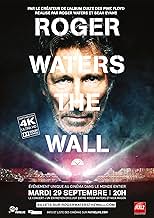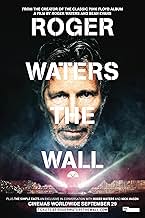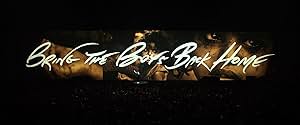Detalha uma das produções teatrais mais elaboradas da história da música, com o vocalista do Pink Floyd, Roger Waters, interpretando o álbum The Wall da banda, aclamado pela crítica, na ínte... Ler tudoDetalha uma das produções teatrais mais elaboradas da história da música, com o vocalista do Pink Floyd, Roger Waters, interpretando o álbum The Wall da banda, aclamado pela crítica, na íntegra.Detalha uma das produções teatrais mais elaboradas da história da música, com o vocalista do Pink Floyd, Roger Waters, interpretando o álbum The Wall da banda, aclamado pela crítica, na íntegra.
- Direção
- Roteiristas
- Artistas
- Prêmios
- 1 indicação no total
- Guitars
- (as David Kilminster)
- Vocals
- (as Robbie Wycoff)
- Direção
- Roteiristas
- Elenco e equipe completos
- Produção, bilheteria e muito mais no IMDbPro
Avaliações em destaque
Not sure what to expect, Roger Waters The Wall is not a motion picture like Alan Parkers The Wall. It is a documentary of Roger Waters life integrated into The Wall's storyline. Most of the film is taken from a jaw-dropping big scale concert somewhere in Europe.
Roger does a god job as a protagonist and musician, balancing seemingly casual between personal life and the professional creative universe he created with The Wall.
If you like Pink Floyd - hit the wall
But now Waters is not the same man he was when he wrote it 36 years ago and went on your with it with Floyd back in 1980/81; he's an old man with kids and grandkids, and this movie is really about reflecting back again. And again, and again at the loss of something very heavy, this being Eric Fletcher Waters in 1944 in Anzio, and if there's any through-line with the documentary scenes it's that Waters is going to the same site where his dad died. Will he get catharsis? Are even told as much? Who knows.
In a strange way, between this rock show and Waters in real life as we see him in this movie, he's like the rock star equivalent of a superhero; not on the side of doing things heroic, rather I mean the origin story, as we know many/most comic book heroes have in their bones loss. If the loss of Bruce Wayne's parents shaped him to become Batman, then one wonders watching this if Waters' dad made him make The Wall; certainly it wouldn't have the same sort of emotional punch without the loss. That said, it's pushed so much in this story that there's not much room for anything else; there are a couple of anecdotes told between Waters and an old childhood friend, plus his own kids who join him to see his grandfather's grave (which, in a coincidence I didn't know, died as well in WW1 when EF Waters was just two), but aside from that it's all about the loss to the point where it's constricting.
But hey, this IS also about the performance of The Wall concert itself, right? That itself is one of the marvels of rock performances, and has been for so long, though even this is updated from what it used to be - when Pink Floyd first performed the concerts, the brick-by-brick set up of a wall being built in the first half, then finished by the end of 'Goodbye Cruel World', and the rest of the show performed with a wall put up between band and audience (a metaphor for the ages), it was innovative and stark and original. Here it's used again, though this time in 2015 this along with the creator has changed, and audiences seeing it in person get a giant screen projected on the Wall.
I wonder if this has the same effect as it did back in the early 80's, when such technology didn't exist, but it does provide us with a lot of images that compliment and enhance what we're hearing and seeing on stage - pictures of veterans and other civilians that have died in war in the early part of the concert (during "Thin Ice") and, to a not as effective sensation, girls acting all catty and 'sensual' during "Young Lust". What one wants to see is the band perform really, and they all do a smashing good job (GE Smith one of them); one unintentionally ironic part is that The Wall is meant as the metaphor in part for what Waters felt in the late 70's, being disconnected from the very audience he was playing for, and now the filmmakers have lots and lots of shots of the audience, enraptured and loving what they're seeing on stage.
Of course there are only so many ways to shoot a live concert, and if it was focused just on the stage Waters and Evans wouldn't get enough coverage. But it is funny (not in a 'ha-ha' way, just amusing) that the show is both shown as being about in large part a rock start going full blown fascist dictator and stone-cold depressive ("One of My Turns") to an audience that is totally connected, albeit many of them with their phones out, with that being their own wall, so to speak, if one reads into it that way. But ultimately the performance by Waters and his band is so strong and the presentation so lively and inventive in its roots, from the inflatable figures on stage of the teacher and the black pig over the audience, to the Scarfe animations occasionally thrown on the video on the wall, that I couldn't help but be entertained on that audio-visual level alone.
So to sum it all up: the documentary segments are well-shot and interesting on their own, and they'd make for a helluva strong short documentary on tracking the kind of loss that you can never fully get over, but it breaks up the flow of what is the MAIN story, the Wall story itself. It's maybe a more mature and thoughtful film than Parker/Scarfe/Waters' production in 82, but as far as just pure rock and roll experimentation brilliance it doesn't compare. One last nice touch: Waters playing 'When the Tigers Broke Free' on trumpet for his dad.
37 years! Makes me feel old, because I remember buying that album at the time. Now, when I listen to a lot of the music I loved back then, it sounds pretentious and musically lame, but The Wall is one of a handful of albums that continue to be inspiring: the music is still catchy and complex, the lyrics profound, and the artistic vision monumental.
Pink Floyd was always known for the extravagance of their light shows, and Waters raises that in this concert to amazing heights. I mean "raises" literally -- the stage crew gradually build a brick wall at the front of the stage during the concert, so that by half-way through the musicians are completely obscured by a 10m wall and continue to perform behind it.
The wall has always been the central metaphor of the whole project, and Waters has worked that metaphor to the limit through multiple re-interpretations over three decades. We build personal walls to protect ourselves, but they end up isolating and imprisoning us. As he emphasised in the Berlin concert in 1990, the wall can also isolate and imprison nations.
I've always been a great fan of Talking Heads' Stop Making Sense, Laurie Anderson's Home of the Brave, and even pretty impressed with Michael Jackson's posthumous This Is It. But from a creative point of view, The Wall has a scope and attention to detail that surpasses them all. The staggering visual effects complement the storyline of the music and amplify the audacious vision that is both a commentary on war and fear, and a semi-biographical reflection on modern masculinity.
It is that last point that stood out to me as I watched the movie. The lasting value of the whole project is likely to be not the creativity, or the music, or the visual effects but the insightful portrayal of the modern western male psyche. Waters has captured the angst I feel, and I think many of my male peers feel. The ambiguity of whether walls protect or imprison. The shame of expressing emotions. The demoralising outcome of modern education. The distrust of government. The misguided aspiration for rock-star status. The disappointment that life has not delivered what we hoped for. The depressing thought they we are no more than a single brick in a huge impersonal wall.
In another review of this movie, Leslie Felperin accuses Waters of misogyny. I think Felperin is wrong about that, mistaking an honest portrayal of the male experience for a denial of the female experience. The movie is almost devoid of females. All the musicians are male. Waters' travelling companions are male apart from a brief scene with someone I presume is his daughter.
The story in the lyrics reveals a youth who had difficulty separating from a perhaps over-protective mother. The original movie (from memory) had more to say about how that psychological rut was transferred to his wife. That's coupled with an absent father. The commentary in this movie explicitly notes that war caused not only Roger Waters to grow up without a father, but that the same thing was true of his father.
Waters is a man castrated, but consciously on the journey to discover what it means to be a true man.
Along that journey he notes -- and discards -- false ideals of the masculine. Waters' repeated use of faux-Nazi characters and symbols satirically presents the emptiness of the supposedly masculine will to power. Woven throughout the piece is a criticism of the tendency to judge those who are different and the way that is ultimately expressed in the stupidity of waging war against the Other. When it comes to male attitudes to women, he notes the pathetic expression of lust for a "dirty woman", and couples that with a fear of being eaten by a vagina.
One of the best outcomes of feminism is that it has forced men to think about the meaning of masculinity. Waters hasn't resolved that here, but he clearly rejects some possibilities, and I think points towards two more helpful possibilities. In "Nobody Home" he sings "I've got wild staring eyes \ and I've got a strong urge to fly \ but I got nowhere to fly to." What I think Waters is attempting here, or at least pointing towards, is to reclaim the wild man archetype. The problem is, how does one get there from here? We feel trapped behind the wall we have conspired with society to build around our male identity. But let's at least affirm the will to break free.
The second direction Waters points to is the demolition of the wall. Sometimes it can be a conscious deconstruction; other times it is forced upon us as a shameful punishment "to be exposed before your peers." But in the end, as is clear from "Outside the Wall", we need each other.
Você sabia?
- CuriosidadesRoger Waters told that the greatest audience was in the concert of Istanbul. However, this concert was not filmed for this movie, because the decision of which concerts will be filmed is made before gigs occurring.
- Erros de gravaçãoAt the final war memorial, Roger sits down with his bag beside him. He then moves to sit on a different memorial with his horn leaving his bag behind. In the new location, one camera angle incorrectly shows a bag beside him while another shows no bag.
- Citações
Roger Waters: On the tour, I invite about 20 wounded veterans to the show each night. There was one guy. And he just nodded, and then he put his hand out, and I grabbed his hand like that to shake his hand, and he wouldn't let go of my hand. So I thought: "Okay, he obviously wants to say something." And he stood there and looked at me straight in the eyes. Very kind of weird, piercing look. And then he said..."Your father would be proud of you." And it was a very weird moment. I just... I just sort of turned to jelly, really. And I felt myself welling up. I'll never forget him.
- ConexõesReferences Pink Floyd: The Wall (1982)
Principais escolhas
- How long is Roger Waters: The Wall?Fornecido pela Alexa
Detalhes
Bilheteria
- Faturamento bruto mundial
- US$ 2.214.417
- Tempo de duração2 horas 12 minutos
- Cor
- Mixagem de som
- Proporção
- 2.39:1
Contribua para esta página
























